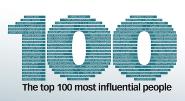 Most of us know LinkedIn, the most popular and best social media platform for accountants. Yet, not very many accountants, accounting professors, accounting students and accounting aficionados use it well.
Most of us know LinkedIn, the most popular and best social media platform for accountants. Yet, not very many accountants, accounting professors, accounting students and accounting aficionados use it well.
Would it help to know that the most influential people in accounting (according to Accounting Today) use LinkedIn and are heavy users? If they have invested serious amounts of time in it, then perhaps so should you.
I use LinkedIn heavily. Over the past year, I pretty much have shifted my social media efforts from blogging on The Summa to interacting with accounting types through LinkedIn. So much so, I might be called Mr. LinkedIn amongst accounting professors. Oh, I think that blogging is still my raison d’être. But LinkedIn is le futur. [Perhaps I can be called Professor Social Media}
You remember the Accounting Today list of the Top 100 Most Influential People in accounting? Published in September of each year, it is Accounting Today’s attempt to capture what’s happening in the industry. Look carefully, and you’ll notice that those savvy in digital era and social technologies get the AT nod as to who should be influential.
80 of the T100 Most Influential People use LinkedIn. 53 use it heavily with 500+ connections. The other 27 have small networks. That’s the scale in online social networks. Large networks are >2,500. Medium sized network have at least 500 contacts.
I categorize the Top 100 Most influential people into those who made the list primarily for (1) blogging/media, (2) audit firm leadership, (3) consultants and vendors, (4) regulators, (5) association leadership, and (6) lobbyists.
Here is my tally of the T100 Most Influential People who use LinkedIn. I provide links to the profiles for the heavy users. You must be signed into LinkedIn to fully see the profiles.
Bloggers. All four who make the T100 list for blogging are on LinkedIn. Heavy users are Dave Albrecht (The Summa), Paul Caron (Tax Prof Blog) and Rick Telberg (CPA Trendlines). Caleb Newquist (Going Concern) also uses LI.
Accounting Firm Leadership. 10/14 who make the T100 list due to their accounting firm leadership are on LinkedIn. Heavy users are Jason Blumer (Blumer & Associates), Jim Bourke (WithumSmith+Brown) , Stephen Chipman (Grant Thornton) and Jody Padar (New Vision CPA Group). Small LI network users who make the T100 list are Rick Anderson (Moss Adams), Ken Baggett (Cohn Reznick), Joe Echevaria (Deloitte), Tom Marino (CohnReznick), Kris McMasters (CliftonLarsonAllen) and Robert Moritz (PWC). Echevaria is barely on LI, with a short profile and a network of zero. What’s the point?
Consultants & Vendors. 40/41 who make the T100 list because of their service to accounting firms/professionals are on LinkedIn. Heavy users are August Aquila (Aquila Global Advisor), Ron Baker (VeraSage Institute), Gary Boomer (Boomer Consulting), Jim Boomer (Boomer Consulting), David Cieslak (Arxis Technology), Gale Crosley (Crosley+Co.), Chris Frederiksen (The 2020 Group), Michelle Golden (Golden Practices), Jeff Gramlich (CCH Small Firm Services), Angie Grissom (The Rainmaker Consulting Group), Pascal Houillon (Sage North America), Randy Johnston (K2 Enterprises), Rita Keller (Keller Advisors), Allan Koltin (Koltin Consulting Group), Taylor Macdonald (Intacct), Jeff Pawlow (The Growth Partnership), Kevin Robert (Wolters Kluwer Tax & Accounting), Marc Rosenberg (The Rosenberg Associates), Bonnie Buol Ruszczyk (BBR Marketing), Rebecca Ryan (Next Generation Consulting), Joel Sinkin (Transition Advisors), Doug Sleeter (The Sleeter Group), Brad Smith (Intuit), Jennifer Warawa (Sage North America), Troy Waugh (The Rainmaker Companies), Geni Whitehouse (Even a Nerd Can Be Heard), Sandra Wiley (Boomer Consulting), Jennifer Wilson (ConvergenceCoaching), Joe Woodard (Scaling New Heights) and Diane Yetter (Yetter Tax Consulting). Other LI users are Erik Asgeirsson (CPA2BIZ), Jon Baron (Thomson Reuters Tax and Acct), Chandra Bhansali (AccountantsWorld), Jim Buttonow (New River Innovation), George Farrah (Bloomberg BNA), Zach Nelson (Netsuite), Jay Nisberg (Jay Nisberg and Associates), Brian Peccarelli (Thomson Reuters Tax and Acct), Terry Putney (Transition Advisors), Jill Ward (Intuit).
Regulators. Only 5/18 who make the T100 list because of their service as regulators of accounting are on LinkedIn. Heavy users are Orrin Hatch (U.S. Senate) and Mitt Romney (presidential candidate). Other LI users are Karen Hawkins (IRS), Terri Polley (FAF) and Leslie Seidman (FASB).
Professional Associations. 19/20 who make the T100 list because of their leadership in professional associations are on LinkedIn. Heavy users are Richard Caturano (AICPA), Richard Chambers (IIA), Calvin Harris (NABA), Marie Hollein (FEI), Tom Hood (MACPA), Erinn Keserica (AAM), Mark Koziel (AICPA), Lana Kupferschmid (NCCPAP), Barry Melancon (AICPA), James Metzler (AICPA), Clarke Price (OSCPA), James Ratley (ACFE), Ralph Thomas (NJSCPA) and Jeffrey Thomson (IMA). Other LI users are JoAnne Barry (NYSSCPA), Parnell Black (NACVA), Loretta Doon (California Society of CPAs), Edward Karl (AICPA) and John Sharbaugh (Texas Society of CPAs).
Lobbyists. Two of the three who make the T100 list because of their leadership of important lobbying organizations are on LinkedIn. Neither Ken Bishop (NASBA) or Cindy Fornelli (Center for Audit Quality) are heavy users.
In the world of accounting, influential leader and LinkedIn go hand in hand.
Debit and credit – – David Albrecht
Want more of The Summa? Sign up to receive email notification of posts. And please follow me on Twitter (@profalbrecht). Connect to me on LinkedIn.
Read Full Post »



















